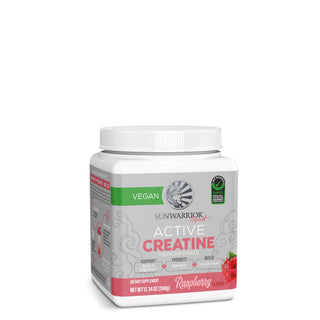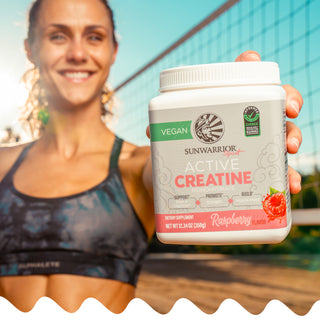
By Sunwarrior Last Updated 11-24-24
Why are you wondering how a supplement known for boosting muscle strength could also support menstrual health? While creatine is well-known for enhancing physical performance, research suggests it may also have surprising benefits for women experiencing menstrual challenges.
From regulating hormones to alleviating discomfort during periods, creatine for women is emerging as a powerful ally. Explore how Creatine: the Game-Changer in Your Sports Performance are connected, uncovering science-backed insights to help you better manage your cycle.
Why Creatine Matters for Women’s Health
Historically, creatine has been associated with athletes and bodybuilders, but its benefits extend far beyond muscle strength. For women, particularly during menstruation, creatine can support hormonal balance, reduce inflammation, and boost energy.
Hormonal fluctuations during the menstrual cycle can lead to discomfort, fatigue, and even mood swings. Adding creatine for women to your routine may address these challenges effectively.
Studies suggest that creatine supplementation may increase estrogen levels, improve blood flow, and enhance cognitive function—key factors for managing menstrual health. Whether you struggle with PMS symptoms or low energy during your period, creatine offers a scientifically backed solution.
When Menstrual Health is Out of Balance
Menstruation is a complex process controlled by hormones that regulate the growth and shedding of the uterine lining. One of the ways to know if your menstrual health needs extra support or care is paying attention to your cycles. Your cycle says a lot about your health. Any imbalance in hormonal levels can lead to irregular cycles—heavier bleeding, skipping periods, bleeding for longer than 7 days, and abnormal bleeding between periods are all signs of irregularity. That irregularity can cause discomfort, mood swings, and other symptoms. For the first few years after a girl starts her period, it is completely normal to be irregular, but after that, if irregularity is still an issue, visiting an OB/GYN is a good idea.
Yeah, But What About Creatine and My Periods?

Creatine is a naturally occurring substance found in our muscles and is synthesized from amino acids. It plays a critical role in energy metabolism, particularly during high-intensity exercise. Creatine supplements have been shown to increase muscle mass, strength, and power, but recent research suggests that creatine may also have benefits for menstrual cycle health.
One study found that creatine supplementation can increase the production of estrogen in women. Estrogen is a key hormone in the menstrual cycle, and an increase in estrogen levels can help regulate the menstrual cycle and reduce symptoms of PMS.
Creatine Improves Estrogen Levels
It has been found that creatine supplementation can increase the production of estrogen in women1. Estrogen is a key hormone in the menstrual cycle, and an increase in estrogen levels can help regulate the menstrual cycle and reduce symptoms of premenstrual syndrome (PMS). The study1 also found that creatine supplementation can improve overall hormonal balance in women.
Creatine Improves Mood

Depression rates are two times higher for women than men. This is due to hormonal variations found in women as they move through their menstrual cycles. Since Creatine improves overall hormonal functions in women, it allows for the stabilization and improvement in mood.
Creatine Improves Sleep and Cognition
Creatine helps you achieve bursts of energy and can be beneficial when battling fatigue. Creatine also plays an important role in brain health as higher resting creatine levels may enhance performance in cognitive tasks such as recognition memory. Brain fog and the inability to focus or achieve restful sleep are often reported by women right before their menstrual cycles due to fluctuations in hormones. Creatine supplementation throughout the menstrual cycle has been shown to alleviate the problems that come from brain fog and sleep deprivation, allowing for greater mental clarity and more plentiful restful sleep1.
Studies also show that vegetarians showed greater visual memory gains than meat eaters after taking creatine.
Creatine Improves Blood Flow
Another study found that creatine supplementation can improve blood flow to the uterus2. This increased blood flow can help support the growth and shedding of the uterine lining, which is essential for a healthy menstrual cycle.
Creatine Reduces Inflammation

As an antioxidant, Creatine may also help reduce inflammation in the body, which can contribute to menstrual cycle irregularities. Studies show that creatine supplementation can reduce levels of C-reactive protein (CRP), a marker of inflammation in the body1. Inflammation is a common underlying factor in many menstrual cycle disorders, and reducing inflammation through creatine supplementation may help support menstrual cycle health.
Individual responses to creatine supplementation may vary. Because of the nature of menstrual cycles, it takes two cycles to know if it is improving your individual situation. Optimum results were shown in women who not only took creatine supplementation but also engaged in regular strength training. It is also crucial to consult with a healthcare professional before starting any new supplement or making changes to your diet, particularly if you are pregnant, nursing, or have any underlying medical conditions.
While more research is needed to fully understand the potential benefits of creatine for menstrual cycle health, current evidence suggests that creatine may play a role in regulating hormonal levels, improving blood flow to the uterus, and reducing inflammation, all of which can support menstrual cycle health.
Sunwarrior’s Active Creatine mixed with 10–12 ounces of your favorite beverage may just be the thing you are looking for to improve your menstrual health and revive your mind.
Does Creatine Help with Period Cramps?
Period cramps are caused by the contraction of the uterine muscles, often exacerbated by inflammation. Creatine acts as an antioxidant, helping to reduce inflammation in the body.
A study published in Nutrients found that creatine supplementation could lower C-reactive protein (CRP) levels, a marker of inflammation, which may contribute to easing period cramps.
Additionally, improved blood flow facilitated by creatine may alleviate cramping by delivering more oxygen and nutrients to uterine tissues. Women incorporating creatine for menstrual health have reported feeling less discomfort over time.
Creatine for PMS and Hormonal Balance
Premenstrual Syndrome (PMS) affects 75% of menstruating women, with symptoms like mood swings, bloating, and fatigue. Creatine helps stabilize hormonal levels, particularly estrogen, which is pivotal for menstrual cycle regulation. A 2021 study indicated that women taking creatine supplements experienced fewer mood swings and more stable energy levels throughout their cycles.
Moreover, by supporting the brain's energy metabolism, creatine has been linked to improved mental clarity and reduced "brain fog" often associated with PMS. This makes it a game-changer for women seeking natural ways to mitigate hormonal fluctuations.

Creatine and Exercise During the Menstrual Cycle
Staying active during your period can be challenging, but creatine can enhance performance and recovery. By replenishing energy stores, creatine enables women to maintain their fitness routines even during menstruation. Studies show that women using creatine for menstrual health reported increased stamina and less fatigue during workouts.
This supplement's ability to reduce oxidative stress further supports muscle recovery, ensuring that you can train effectively without exacerbating period-related fatigue.
Creatine for Her: All the Questions You Never Knew You Needed Answered
Best Practices for Using Creatine for Menstrual Health
Dosage: The recommended dosage is 3–5 grams daily. For beginners, starting with a "loading phase" of 20 grams spread over 4 servings per day for 5–7 days may speed up results.
Timing: Take creatine consistently, regardless of your cycle phase. Pair it with workouts for maximum benefit.
Dietary Pairing: Mix creatine with carbohydrate-rich beverages for better absorption.
For more personalized advice, consult with a healthcare provider before starting creatine supplementation, especially if you’re pregnant or on medication.
Potential Risks and Considerations
While creatine is generally safe, mild side effects like bloating or dehydration can occur if not consumed with adequate water. It’s crucial to maintain proper hydration and adhere to recommended dosages to avoid these issues.
Future of Research on Creatine and Women’s Health
The connection between creatine and menstrual health is a growing field of interest. Current research highlights its benefits, but future studies will likely uncover additional ways this supplement can support women’s hormonal and overall health. This exciting potential makes creatine for women a topic worth exploring further.
Conclusion
Incorporating creatine into your routine can significantly enhance your menstrual health, from reducing cramps and fatigue to stabilizing mood and hormonal balance. Whether you're navigating challenging PMS symptoms or simply looking to support your overall well-being, creatine for women offers a natural and effective solution.
For a trusted source of high-quality creatine, explore Sunwarrior’s products here. Give your body the care it deserves, starting today!

FAQs
Can creatine help with PMS symptoms?
Yes, studies suggest that creatine can stabilize estrogen levels and support brain energy metabolism, reducing mood swings, fatigue, and other PMS-related symptoms.
How does creatine reduce fatigue during menstruation?
By replenishing energy stores in muscles and the brain, creatine combats the fatigue commonly experienced during menstruation, helping women feel more energized.
Does creatine make your period heavier?
No evidence suggests that creatine affects menstrual flow. It supports overall hormonal health without altering the volume of bleeding.
Is creatine safe for women to use daily?
Yes, creatine is safe for daily use when consumed within the recommended dosage (3–5 grams).
What is the recommended dosage of creatine for menstrual health?
A daily dose of 3–5 grams is generally effective. For quicker results, a loading phase of 20 grams daily for a week is often recommended.
Does creatine affect hormonal balance?
Yes, creatine has been shown to support estrogen production, contributing to better hormonal balance.
Can creatine reduce menstrual cramps?
Yes, by improving blood flow and reducing inflammation, creatine may alleviate menstrual cramps.
Are there any side effects of creatine for women?
Mild side effects like bloating or dehydration can occur, but these are rare with proper hydration and dosage.
How soon can I expect results from using creatine for menstrual health?
Most women notice benefits within 1–2 menstrual cycles. Consistency is key for optimal results.
Can I take creatine if I’m on birth control?
Yes, creatine is safe to use with birth control. However, consult your healthcare provider for personalized advice.
References:












